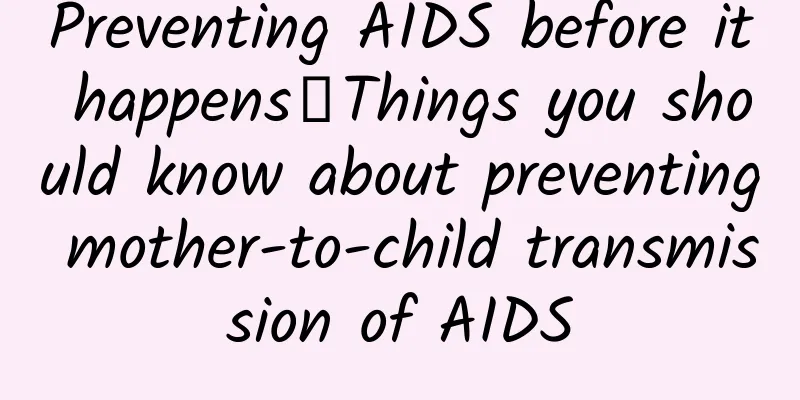Preventing AIDS before it happens丨Things you should know about preventing mother-to-child transmission of AIDS

|
What is AIDS? Experts from Yiyang Central Hospital said that AIDS, the full name of which is "Acquired Immune Deficiency Syndrome" (AIDS), is a serious infectious disease caused by the human immunodeficiency virus (HIV). It can destroy the human immune system, is highly hidden and contagious, and is the most dangerous source of infection. In the early stages of infection, infected people can live and work without any symptoms, but it will take 2-10 years for them to develop AIDS-related symptoms and develop into AIDS patients. What is mother-to-child transmission of HIV? If a woman is infected with HIV, she can pass it on to her child through pregnancy, childbirth, and breastfeeding, which is called mother-to-child transmission of HIV. Mother-to-child transmission of HIV is the main way for children to be infected with HIV. Studies have shown that without any intervention, the probability of children being infected with HIV through mother-to-child transmission is about 30%, but after effective intervention, the mother-to-child transmission rate can be reduced to less than 2%, or even lower. How to prevent mother-to-child transmission of HIV? 1. Before pregnancy Women of childbearing age should reduce high-risk behaviors and should do pre-pregnancy eugenics checkups if they are planning to get pregnant. Those who have high-risk behaviors are advised to go to a regular hospital for timely testing. If the test result is positive, pregnancy should be postponed. Those who have been confirmed to be infected need to see a doctor regularly and receive standardized treatment. Those who are planning to get pregnant should choose the best time for pregnancy under the guidance of a doctor. For women who have recently been infected with HIV, the viral load is very high in the first few months of infection, so the risk of transmitting the virus to the newborn is very high. For women of childbearing age who are infected, the best time to get pregnant is after regular treatment and the viral load is negative for 6 months. 2. Pregnancy Pregnant women should undergo HIV screening during prenatal checkups, with the first checkup preferably before 12+6 weeks of pregnancy. If the screening result is negative, pregnant women should have regular prenatal checkups and avoid high-risk behaviors to reduce the chance of mother-to-child transmission of the disease. If the screening result is positive, the pregnant woman needs to be re-examined. If it is still positive, further examinations (i.e. additional tests) are needed to confirm the diagnosis. Once diagnosed, pregnant women should seek help from the local maternal and child health care hospital as soon as possible, receive standardized health management under the guidance of the local maternal and child health care hospital, take antiviral drugs under the guidance of a doctor, and conduct relevant tests regularly to assess the infection status, determine the medication plan and monitor the treatment effect. 3. Postpartum (1) Choice of feeding method for infected pregnant women If you insist on breastfeeding, mothers must insist on taking antiviral drugs and exclusive breastfeeding, breastfeeding correctly, and avoiding nipple damage, because breast milk plus other food or liquid (including water) feeding can damage the baby's intestinal mucosa, increase the risk of diarrhea, and make it easier for the virus to enter the baby's body. Therefore, mothers who cannot exclusively breastfeed are advised to choose artificial feeding. If artificial feeding is chosen, the milk powder should be properly prepared and the utensils should be cleaned and disinfected. Promote artificial feeding, avoid breastfeeding, and eliminate mixed feeding. (2) Medication guidance for infants born to infected pregnant women Babies born to infected pregnant women should take antiviral drugs as soon as possible after birth (within 6 hours) to reduce the risk of intrauterine and intrapartum mother-to-child transmission. Doctors will assess the child's risk of infection based on the mother's infection during pregnancy and standardized medication, select appropriate prevention and treatment plans for the child, and guide medication use. Infection status diagnosis and follow-up 1. Early diagnosis and testing In order to determine whether babies born to infected pregnant women are infected as early as possible, babies need to have heel blood drawn or blood drawn at the birth hospital or local maternal and child health care hospital within 48 hours after birth, at 6 weeks and 3 months of age, and undergo early diagnosis through nucleic acid testing. If two early diagnosis results are positive, they can be diagnosed as HIV infection. If the three early diagnosis results are negative or the early diagnosis test is not performed, HIV antibody screening tests should be continued at 12 and 18 months of age to determine the infection status. If the screening result of the child at 12 months of age is negative, HIV infection can be ruled out; if it is positive, the screening result is negative again at 18 months of age, which can rule out HIV infection; if the screening result of the child at 18 months of age is positive, multiple tests are required to confirm the diagnosis. Antibody testing too early will be interfered by the antibodies given to the baby by the mother during pregnancy, and it cannot be determined whether the baby is infected. 2. Vaccination Immunization is very necessary for children infected with HIV. No live attenuated vaccine can be given to infants before infection is ruled out. Consultation should be conducted at local maternal and child health care hospitals and community health service centers to receive scientific immunization programs. References: Practical Neonatology, People's Medical Publishing House, 5th edition; "Infectious Diseases" People's Medical Publishing House, 9th edition. Hunan Medical Chat Special Author: Liu Ping from Yiyang Central Hospital Follow @湖南医聊 to get more health science information! (Edited by YH) |
<<: Will I get pneumonia if I am intubated and put on a ventilator?
>>: Summary of clinical experience in using bronchial occluders
Recommend
What are pimples in private parts?
Gynecological diseases, to put it simply, are uni...
What are the reasons why it hurts when you urinate?
Pain when urinating is actually the pain in the u...
What are the benefits of soaking your feet in mugwort?
The feet are the center of the human body's m...
Baby indigestion mother avoid eating
Generally speaking, there is no immediate connect...
Efficacy of Traditional Chinese Medicine in Treating Amenorrhea
Amenorrhea is quite threatening to women's bo...
How to deal with joint pain during confinement
If a woman develops postpartum disease during the...
Going to the emergency room due to fruit "poisoning"? Doctor: Eat less, eating too much can really put your life in danger!
If you want to talk about which fruit is the most...
I want to defecate after using Kangfu Anti-inflammatory Suppository
Drugs such as Kangfu Anti-inflammatory Suppositor...
What foods are good for breast enlargement?
Many women dream of having full and round breasts...
Can I put pumpkin in millet porridge? When is the best time to put pumpkin in millet porridge?
We all know that there are many ways to cook mill...
10 weeks pregnant stomach pain
The creation of the birth of new life is a very h...
How to do vaginal tightening exercise
If a woman has experienced multiple miscarriages ...
How to treat incomplete septate uterus?
At present, many female friends are facing the tr...
[What to do?] How to deal with more than 80 million infected people and high-risk factors for cancer? !
Mr. Li (pseudonym), who is over 60 years old, was...









